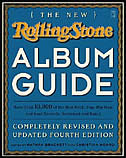| Working Drafts and Notes For: [The New] Rolling Stone Album Guide |
 |
Waco Brothers
| To the Last Dead Cowboy (Bloodshot, 1995) | |
| Cowboy in Flames (Bloodshot, 1997) | |
| Do You Think About Me? (Bloodshot, 1997) | |
| Wacoworld (Bloodshot, 1999) | |
| Electric Waco Chair (Bloodshot, 2000) | |
| New Deal (Bloodshot, 2002) |
The Waco Brothers is Jon Langford's local bar band, a side-project for the founder and mainstay of the Mekons. But while the Mekons are still as artistically viable and commercially marginal as ever, they only work together occasionally, having scattered to the far corners of the globe. Langford, originally from Wales, wound up in Chicago, where he found a few congenial fellows to gig with.
But while Langford is the first name one associates with the Wacos, it makes just as much sense to view them as the second coming of Wreck, Dean Schlabowske's alt-country band. Langford produced Wreck's last album, and found in Deano a kindred spirit with an aesthetic firmly rooted in honky-tonk and a clear, cynical gaze on the capitalist rot all around.
Still, it's hard for an outsider to tell who does what here. The Wacos are a six man band who over six albums have had only one personnel change (Allen Doughty replacing Tom Ray on bass starting with the second album), with three vocalists and all compositions credited to the group. This distinguishes them from the singer-songwriters who dominate alt-country, although volume (loud) and tempo (fast) are also distinctive. As are the often-biting lyrics, which are pure class consciousness from "Plenty Tough, Union Made" to "Dragging My Own Tombstone."
The six albums are remarkably consistent, the main difference being that the first one is both artier and more country, like a Mekons album. But by the second album they had simplified the songs and punched up the volume, spiced with the occasional country cover like "Wreck on the Highway" or "Johnson to Jones." And if the latter albums have a slight edge, that just means that their songcraft is getting sharper.
Jon Langford
| Skull Orchard (Sugar Free, 1998) | |
| Mayors of the Moon (Bloodshot, 2003) | |
| All the Fame of Lofty Deeds (Bloodshot, 2004) |
It's not that unusual for a jazz musician like Charlie Haden or David Murray to juggle several distinct groups over extended periods of time, but it no one in rock has done it more dexterously than Mekons' founder Jon Langford. While Langford has continued to record with the Mekons since 1979, he recorded a dozen albums with the Three Johns in the '80s, and since then has spun out groups like the Killer Shrews, the Waco Brothers, and the Pine Valley Cosmonauts. His solo album, Skull Orchard, provides a sort of baseline to what Langford brings to his groups: rock and roll that takes simplicity as a virtue, and sharp wordplay that cuts no slack for cliche.
Mayors of the Moon puts Langford in front of a Canadian alt-country group called the Sadies, shaping up a tight set of songs that plays like a slightly lighter version of the Waco Brothers. All the Fame of Lofty Deeds is even looser musically, as countryish as the Mekons' Whiskey and Sin, as political as the Waco Brothers' To the Last Dead Cowboy, more personal than either.
The Pine Valley Cosmonauts
| Misery Loves Company: The Songs of Johnny Cash (Bloodshot, 1995) | |
| Salute the Majesty of Bob Wills (Bloodshot, 1998) | |
| Beneath the Country Underdog (Bloodshot, 2000) | |
| The Executioner's Last Songs, Vol. 1 (Bloodshot, 2002) | |
| The Executioner's Last Songs, Vol. 2 & 3 (Bloodshot, 2003) |
The Cosmonauts are another Jon Langford project, where various sets of Waco Brothers and Waco Cousins get together to form left-wing country's foremost backing band. The two tribute albums differ in that the Cash set is sung by Langford only with a teeth-grinding grimness, while the Wills set is pure celebration, rotating standards through guest vocalists (most notably Jimmie Dale Gilmore).
In Beneath the Country Underdog, the Cosmonauts play backing band for Kelly Hogan, while The Executioner's Last Songs is a benefit for the Illinois Death Penalty Moratorium Project, with guest vocalists taking turns at songs of death, murder, and executions, not that it makes all that much difference. Vol. 1 sets the course; Vol. 2 & 3 piles on more of the same, recycling a few songs for alternate singers.